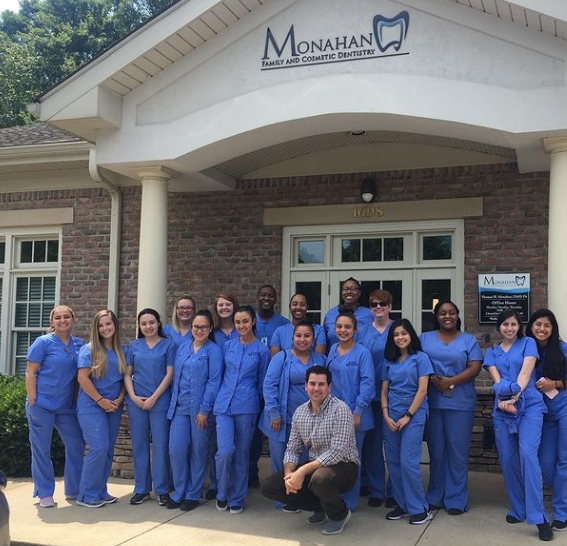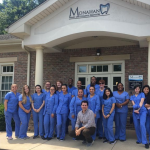Periodontal disease or gum disease is a bacterial illness that affects the gums and bones that support your teeth. The ADA found that this disorder is a major cause of tooth loss in adults. Studies reveal that about 50% of people over 30 have some form of gum disease.
Plaque, a coating of bacteria that sticks to your teeth and accumulates over time, is the primary culprit in the development of gum disease. Without brushing and flossing often, plaque can harden and turn into tartar. Unfortunately, it's only a dental expert that can get rid of tartar build-up. Inflammation and infection in the gums can be caused by the bacteria that are found in plaque and tartar, which can then lead to the deterioration of the tissue and bone that supports your teeth.
In the beginning stages of gum disease, your gums might become inflamed, red, and tender. You might also notice some bleeding when brushing or flossing. Additionally, you may notice bad breath. This condition, which is called gingivitis, is frequently reversible with the help of routine dental cleanings and practices that promote good oral hygiene. However, if the gum disease isn't treated immediately, it can result in periodontitis which is a more severe form of the illness that can cause irreparable damage to both the gums and bones that serve as support to your teeth. Periodontitis can be prevented by getting gum disease treated as soon as possible.
Damage to the bone and tissue that supports your teeth increases the risk of those teeth becoming loose, moving out of position, or even falling out. When the bone and tissue that support your teeth are damaged, there is a higher risk of them becoming loose, shifting or even falling out. Adults need to be extra cautious about gum disease, as it can be a major cause of tooth loss. Not only does gum disease cause tooth loss, but it's also linked to other serious health problems like heart disease, stroke, and diabetes.
It is critical to take preventative measures against periodontal disease to preserve both dental and general health. In this context, "practicing good oral hygiene habits" refers to doing things like brushing and flossing your teeth daily, as well as going to the dentist for checkups and cleanings on a regular basis.
Potential Consequences of Ignoring Gum Disease Post-Tooth Extraction
After having a tooth extracted, if you choose to disregard gum disease, you could end up in a very serious situation. The increased likelihood of acquiring periodontal disease or gum disease is the most dangerous repercussion of not treating and maintaining your gums appropriately. When periodontal disease is not addressed, it can lead to major oral health problems, such as the loss of teeth and bleeding gums. Besides, not getting gum disease treated after removing a tooth can cause more inflammation in the mouth, making existing medical issues like diabetes or heart disease worse.
If you ignore gum disease after having teeth extracted, it could potentially have a detrimental impact on your appearance. This is only one of the potential consequences. Periodontal disease can be pretty nasty, making your gums recede and teeth become loose. This can really make a person feel bad about the way they look, which affects their self-confidence.
Finally, if a condition is left untreated after a tooth is extracted, it might cause bone loss in the jawbone, which is what holds the teeth in place. This can lead to the teeth being more mobile, which, if left untreated for a lengthy period of time, could finally result in tooth loss. Additionally, it might make subsequent dental surgeries more challenging or even impossible due to the lack of sufficient support for the teeth that are damaged by the condition.
Oral Hygiene Practices to Combat Gum Disease Post-Tooth Extraction
Here are some oral hygiene practices you can use to help combat the development of gum disease:
• Make sure you brush your teeth twice a day with a soft-bristled toothbrush and toothpaste that has fluoride in it. Don't forget to thoroughly clean the area near your gums!
• Floss daily to remove any food particles or bacteria that may be stuck between teeth or around the extraction site.
• Use an antiseptic rinse or mouthwash containing chlorhexidine (CHX) before bedtime and again in the morning to help cleanse and soothe the area.
• Avoid smoking as it can slow down healing and increase the risk of infection.
• Visit your dentist or oral health professional at least every 6 months for a check-up and cleaning. This will help to any signs of gum disease are detected early and treated appropriately.
It's easy to take care of your gums after a tooth extraction. Just following these steps can help you keep good oral hygiene and reduce the risk of gum disease. If you've got any doubts, don't be scared to ask your dental team for advice.
Seeking Professional Help for Persistent Gum Disease
Be sure to consult with your dentist or another oral health professional if you continue to experience any symptoms after having a tooth extracted, especially if those symptoms include excessive bleeding, swelling, or pain. If gum disease has gotten worse, your dentist might suggest antibiotics or even surgery. It's definitely something to think about if you're dealing with gum issues.
Seeking Professional Help for Persistent Gum Disease
It is important that you consult with your dentist or another oral health professional if you continue to experience any symptoms after having a tooth extracted, especially if those symptoms include excessive bleeding, swelling, or pain. They will be able to evaluate the circumstance and decide whether or not any treatment is required at this time. If the gum disease has progressed to a more serious stage, your dentist may suggest antibiotics or even surgery as a treatment option.
When it comes to your oral health, it is always preferable to be proactive and take steps today to avoid gum disease from occurring in the long term. This will ensure the greatest possible outcome. After removing teeth, it is important to maintain proper oral hygiene practices and seek prompt treatment for any problems. Doing so will help ensure that your teeth will continue to be strong and healthy for many years to come.
Professionals To Take Care Of You
At our practice here at Monahan Family and Cosmetic Dentistry, we have the experience and expertise to provide you with the best dental care. Our friendly team of professionals is available to assist you in making the right decisions for your oral health, so don’t hesitate to contact us if you require any advice or treatment.
We understand that an extraction can be a stressful experience, which is why we strive to ensure that your visit is as comfortable and stress-free as possible. Our goal is for you to leave our office feeling satisfied with the care you have received, confident that your oral health will remain strong and healthy in the long term.




























